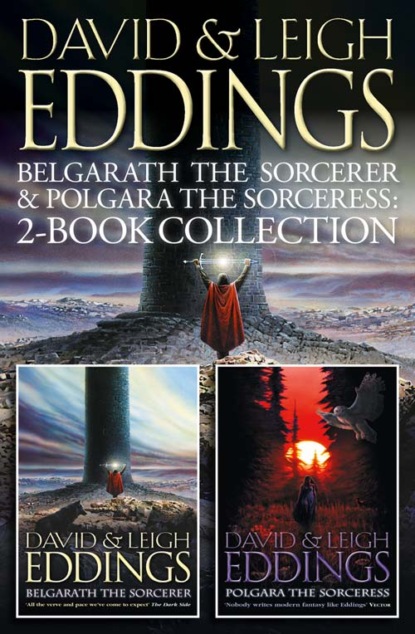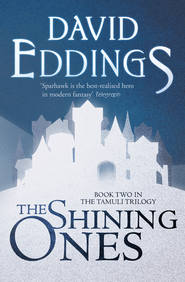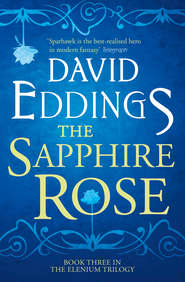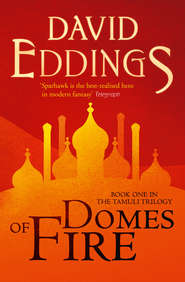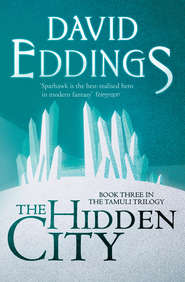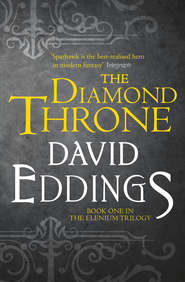По всем вопросам обращайтесь на: info@litportal.ru
(©) 2003-2025.
✖
Belgarath the Sorcerer and Polgara the Sorceress: 2-Book Collection
Автор
Год написания книги
2019
Настройки чтения
Размер шрифта
Высота строк
Поля
The frothing at the mouth definitely concerned my companion, though. It took me quite some time to persuade her that the red-bearded berserker wasn’t really rabid. Wolves, quite naturally, try to avoid rabid creatures, and my little friend was right on the verge of washing her paws of the lot of us.
Our encounters with the Children of the Dragon-God grew more frequent as we drew nearer and nearer to the High Places of Korim, which at that time was the center of Angarak power and population. We managed to obliterate a fair number of walled Angarak towns on our way south, and the reports filtering in from our flanks indicated that the other races involved in our assault on Torak’s people were also destroying towns and villages as we converged on Korim.
The engines devised by Belmakor and Beldin worked admirably, and our customary practice when we came on one of those walled towns was to sit back and lob boulders at the walls for a few days while my brothers and I raked the place with tornadoes and filled the streets with illusory monsters. Then, when the walls had been reduced to rubble and the inhabitants to gibbering terror, we’d charge in and kill all the people. I tried my best to convince Chaggat that it was really uncivilized to slaughter all those Angaraks and that he ought to give some consideration to taking prisoners. He gave me that blank, uncomprehending stare that all Alorns seem born with and said, ‘What for? What would I do with them?’
Unfortunately, the barbarians we accompanied took to Belsambar’s notion of burning people alive enthusiastically. In their defense, I’ll admit that they were the ones who actually had to do the fighting, and somebody who’s on fire has trouble concentrating on the business at hand. Quite often Chaggat’s Alorns would batter down a wall and rush into a town where all the inhabitants had already burned to death. That always seemed to disappoint the Alorns.
In his defense, I must say that Torak finally did mount a counter-attack. His Angaraks came swarming out of the Mountains of Korim like a plague, and we met them on all four sides. I don’t like war; I never have. It’s the stupidest way imaginable to resolve problems. In this case, however, we didn’t have much choice.
The outcome was ultimately a foregone conclusion. We outnumbered the Angaraks by about five to one or better, and we annihilated them. Go someplace else to look for the details of that slaughter. I don’t have the stomach to repeat what I saw during those awful two weeks. In the end, we drove them back into the High Places of Korim and began our inexorable advance on Torak’s ultimate stronghold, that city-temple that surmounted the highest peak. Our master frequently exhorted his brother to return the Orb, pointing out to him that his Angaraks verged on extinction, and that without his children, Torak was nothing. The Dragon-God wouldn’t listen, however.
The ruggedness of the terrain on the eastern slopes of the mountains of Korim had forced the Marags and Nyissans to make their approach from the south. Had it not been for that, the disaster which followed would have been far worse.
It was the prospect of losing all of his children that ultimately drove the Dragon-God over the line into madness. Faced with the choice of either surrendering the Orb or losing all of his worshipers, Torak, to put it bluntly, went crazy. The madness of man is bad enough, but the madness of a God? Horrible!
Driven to desperation, my Master’s brother took that ultimate step which only his madness would have suggested to him. He knew what would happen. There is no way that he could not have known. Nonetheless, faced with the extermination of all of Angarak, he raised the Orb. His control of my Master’s Orb was tenuous at best, but he raised it all the same.
And with it, he cracked the world.
The sound was like no sound I’d ever heard before – or have heard since. It was the sound of tearing rock. To this very day I still start up from a sound sleep, sweating and trembling, as the memory of that dreadful sound echoes down to me through five millennia.
The Melcenes, who are quite competent geologists, described what really happened to the world when Torak broke it apart. My own studies confirm their theories. The core of the world is still molten, and that primeval protocontinent, which we all thought so firm, actually floated on that seething underground sea of liquid rock, not unlike a raft.
Torak used the Orb to break the strings that held the raft together. In his desperation to save his Angaraks, he split the crust of that huge land-mass apart so that the rest of mankind could not complete the destruction of his children. The crack he made was miles wide, and the molten rock from far below began to spurt up through that awful chasm. In itself, that would have been catastrophic enough – but then the sea poured into the newly created fissure. Believe me, you don’t want to spill cold water on boiling rock!
The whole thing exploded!
I would not even venture to guess how many people died when that happened – half of mankind at the very least, and probably far more. Had the geography of eastern Korim been more gentle, the Marags and Nyissans would in all probability have drowned or wound up living in Mallorea. At any rate, the world we had known ended in that instant.
Torak paid a very dear price for what he had done, however. The Orb was not at all happy to be used in the way he used it. Belsambar had been right. Torak had seen fire in his future, and the Orb gave him fire. As it happened, he raised the Orb with his left hand, and after he cracked the world, he didn’t have a left hand anymore. The Orb burned it down to cinders. Then, as if to emphasize its discontent, it boiled out his left eye and melted down the left side of his face just for good measure. I was ten miles away when it happened, and I could hear his shrieks as clearly as if he’d been standing next to me.
The really dreadful part of the whole business lies in the fact that, unlike humans, the Gods don’t heal. We expect a few cuts, bruises and abrasions as we go through life; they don’t. Healing is built into us. The Gods aren’t supposed to need it.
After he cracked the world, Torak definitely needed healing. It’s entirely probable that he felt that first searing touch of fire from the moment he cracked the world until that awful night some five thousand years later when, stricken, he cried out to his mother.
The earth shrieked and groaned as the power of the Orb and the Will of Torak burst the plain asunder, and, with a roar like ten thousand thunders, the sea rushed in to explode and seethe in a broad, foaming band between us and the children of the Dragon-God. The cracked land sank beneath our feet, and the mocking sea pursued us, swallowing the plain and the villages and the cities which lay upon it. Then it was that Gara, the village of my birth, was lost forever, and that fair, sparkling river I so loved was drowned beneath the endlessly rolling sea.
A great cry went up from the hosts of mankind, for indeed, the lands of most of them were swallowed up by the sea which Torak had let in.
‘How remarkable,’ the young she-wolf at my side observed.
‘You say that overmuch,’ I told her sharply, stung by my own griefs. Her casual dismissal of the catastrophe we’d just witnessed seemed a little understated and more than a little cold-blooded.
‘Do you not find it remarkable?’ she asked me quite calmly. How are you going to argue with a wolf?
‘I do,’ I replied, ‘but one should not say that too often, lest one be thought simple.’ It was a spiteful thing to say, I’ll grant you, but her calm indifference to the death of over half my species offended me. Over the years I’ve come to realize that my helpless irritation with her quirks is one of the keystones of our relationship.
She sniffed. That’s a maddening trait of hers. ‘I will say as I wish to say,’ she told me with that infuriating superiority of all females. ‘You need not listen if it does not please you, and if you choose to think me simple, that is your concern – and your mistake.’
And now we were confounded. The broad sea stood between us and the Angaraks, and Torak stood on one shore and we upon the other.
‘What do we do, Master?’ I demanded of Aldur.
‘We can do nothing,’ he replied. ‘It is finished. The war is over.’
‘Never!’ Belar cried. ‘My people are Alorns. I shall teach them the ways of the sea. If we cannot come upon the traitor Torak by land, my Alorns shall build a great fleet, and we shall come upon him by sea. The war is not done, my brother. Torak hath smote thee, and he hath stolen away that which was thine, and now he hath drowned this fair land in the death-cold sea. Our homes and our fields and forests are no more. This I tell thee, my beloved brother, and my words are true. Between Alorn and Angarak there shall be endless war until the traitor Torak be punished for his iniquities – yea, even if it prevail so until the end of days!’ Oh, Belar could be eloquent when he set his mind to it. He loved his beer tankard and his adoring Alorn girls, but he’d set all that aside for the chance to make a speech.
‘Torak is punished, Belar,’ my Master said to his enthusiastic younger brother. ‘He burns even now – and will burn forever. He hath raised the Orb against the earth, and the Orb hath requited him for that. Moreover, now is the Orb awakened. It came to us in peace and love. Now it hath been raised in hate and war. Torak hath betrayed it and turned its gentle soul to stone. Now its heart shall be as ice and iron-hard, and it will not be used so again. Torak hath the Orb, but small pleasure shall he find in the having. He may no longer touch it, neither may he look upon it, lest it slay him.’
My Master, you’ll note, was at least as eloquent as Belar.
‘Nonetheless,’ Belar replied, ‘I will make war upon him until the Orb be returned to thee. To this I pledge all of Aloria.’
‘As thou wouldst have it, my brother,’ Aldur said. ‘Now, however, we must raise some barrier against this encroaching sea, lest it swallow up all the dry land that is left to us. Join, therefore, thy Will with mine, and let us put limits upon this new sea.’
Until that day I had not fully realized to what degree the Gods differed from us. As I watched, Aldur and Belar joined their hands and looked out over the broad plain and the approaching sea.
‘Stay,’ Belar said to the sea, raising one hand. His voice wasn’t loud, but the sea heard him and stopped. It built up, angry and tossing, behind the barrier of that single word, and a great wind tore at us.
‘Rise up,’ Aldur said just as softly to the earth. My mind was staggered by the immensity of that command. The earth, so newly wounded by Torak, groaned and heaved and swelled. And then, before my very eyes, it rose up. Higher and higher it rose as the rocks beneath cracked and shattered. Out of the plain there shouldered up mountains which hadn’t been there before, and they shuddered away the loose earth the way a dog shakes off water, to stand as an eternal barrier to the sea which Torak had let in.
Have you ever stood about a half-mile from the center of that sort of thing? Don’t, if you can possibly avoid it. We were all hurled to the ground by the most violent earthquake I’ve ever been through. I lay clutching at the ground while the tremors actually rattled my teeth. The freshly broken earth groaned and even seemed to howl. And she wasn’t alone. My companion crouched at my side, raised her face to the sky and also howled. I put my arms about her and held her tightly against me – which probably wasn’t a very good idea, considering how frightened she was. Oddly, she didn’t try to bite me – or even growl at me. She licked my face instead, as if she were trying to comfort me. Isn’t that peculiar?
When the shaking subsided, we all regained our composure somewhat and stared first at that new range of mountains and then toward the east, where Torak’s new sea was sullenly retreating.
‘How remarkable,’ the wolf said as calmly as if nothing had happened.
‘Truly,’ I could not but agree.
And then the other Gods and their peoples came to the place where we were and marveled at what Belar and my Master had done to hold back the sea.
‘Now is the time of sundering,’ my Master told them sadly. ‘This land which was once so fair and sustained our children in their infancy is no more. That which remains here on this shore is bleak and harsh and will no longer support your people. This then is mine advice to ye, my brothers. Let each take his own people and journey into the west. Beyond the mountains wherein lies Prolgu ye shall find another fair plain – not so broad perhaps nor so beautiful as that which Torak hath drowned this day – but it will sustain the races of man.’
‘And what of thee, my brother?’ Mara asked him.
‘I shall take my disciples and return even to the Vale,’ Aldur replied. ‘This day hath evil been unloosed in the world, and its power is great. The Orb revealed itself to me, and through its power hath the evil been unloosed. Upon me, therefore, falls the task of preparation for the day when good and evil shall meet in that final battle wherein shall be decided the fate of the world.’
‘So be it then,’ Mara said. ‘Hail and farewell, my brother.’ And he turned and with Issa and Chaldan and Nedra and all their people, they went away toward the west.
But Belar lingered. ‘Mine oath and my pledge bind me still,’ he declared. ‘I will not go to the west with the others, but will take my Alorns to the unpeopled lands of the northwest instead. There we will seek a way by which we may come again on Torak and his children. Thine Orb shall be returned unto thee, my brother. I shall not rest until it be so.’ And then he turned and put his face to the north, and his tall warriors followed after him.
My master watched them go with a great sadness on his face, and then he turned westward and my brothers and I followed after him as, sorrowing, we began our journey back to the Vale.
PART TWO (#ulink_a53ddc39-ff51-5f4c-8109-9191d1a655b4)
The Apostate (#ulink_a53ddc39-ff51-5f4c-8109-9191d1a655b4)
Chapter 7 (#ulink_e20365c4-2054-5a4b-bf58-7d17b0413e29)





